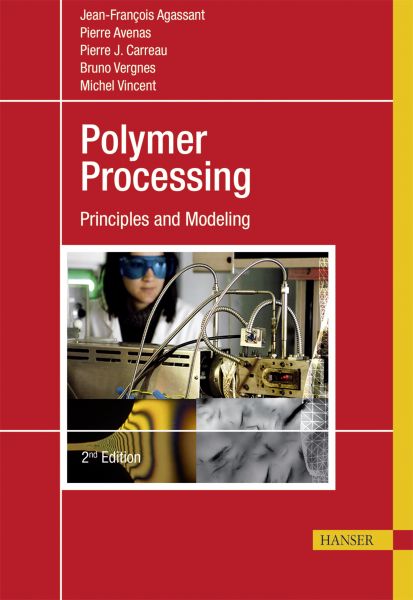Polymer Processing
Principles and Modeling
Pierre Carreau is Professor Emeritus at the Department of Chemical Engineering at the École Polytechnique in Montreal. He is well known for developing the Carreau Fluid Model, and the Carreau Viscosity Model is now integrated into most flow simulation software packages for plastics processing.
Engineering of polymers is not an easy exercise: with evolving technology, it often involves complex concepts and processes. This book is intended to provide the theoretical essentials: understanding of processes, a basis for the use of design software, and much more.
The necessary physical concepts such as continuum mechanics, rheological behavior and measurement methods, and thermal science with its application to heating-cooling problems and implications for flow behavior are analyzed in detail. This knowledge is then applied to key processing methods, including single-screw extrusion and extrusion die flow, twin-screw extrusion and its applications, injection molding, calendering, and processes involving stretching.
With many exercises with solutions offered throughout the book to reinforce the concepts presented, and extensive illustrations, this is an essential guide for mastering the art of plastics processing. Practical and didactic, Polymer Processing: Principles and Modeling is intended for engineers and technicians of the profession, as well as for advanced students in Polymer Science and Plastics Engineering.
Introduction
Chapter 1: Continuum mechanics - Review of principles
Strain and rate of strain
Stress and force balance
General equations of mechanics
Chapter 2: Rheological behaviour of molten polymers
The Newtonian behaviour, Navier-Stokes equation
Shear Thinning behaviour
Behaviour of filled polymers
Viscoelasticity of polymeric liquids
Measurements of rheological behaviour
Chapter 3: Energy and heat transfer in polymer processing
Basic notions of energy
Heating and cooling cases
Temperature changes in polymer flows
Chapter 4: Approximation and computation methods
General equations for polymer processing
How to choose a relevant constitutive equation
Boundary conditions
Approximation methods
Pressure build-up mechanisms
Computation methods
Chapter 5: Single screw extrusion and die flows
Single screw extrusion
Extrusion dies
Coextrusion
Chapter 6: Twin-screw extrusion: description and application
General description of the twin-screw extrusion process
Solid conveying and melting
Molten polymer flow
Global model of the twin-screw process
Polymer blend processing
Compounding
Reactive processing
Optimization and scale-up
Conclusion
Exercise: simplified calculation of the flow in a mixing element
Chapter 7: Injection moulding
Presentation
Filling stage
Packing stage
Residual stresses and strains
Non-standard injection moulding processes
Injection moulding of short fibres reinforced thermoplastics
Conclusions
Exercises
Chapter 8: Calendering
Introduction
Thermo-mechanical analysis
Post-extrusion calendering
Chapter 9: Polymer fibres and films
Introduction
Fibre spinning
Biaxial stretching
Cast-film process
Blown film
Blow moulding
Chapter 10: Flow instabilities in polymer processes
Extrusion instabilities
Coextrusion instabilities
Calendering instabilities
Drawing instabilities
Versandkostenfreie Lieferung! (eBook-Download)
Als Sofort-Download verfügbar
- Artikel-Nr.: SW9781569907054450914
- Artikelnummer SW9781569907054450914
-
Autor
Jean-François Agassant, Pierre Avenas, Pierre J. Carreau, Bruno Vergnes, Michel Vincent
- Wasserzeichen ja
- Verlag Carl Hanser Verlag GmbH & Co. KG
- Veröffentlichung 07.08.2017
- Barrierefreiheit
- Keine Angabe: Keine Informationen zur Barrierefreiheit bereitgestellt
- ISBN 9781569907054

